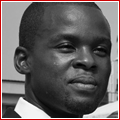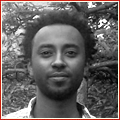Biko and the right to happiness
Posted: 24 March, 2016 Filed under: Saul Leal | Tags: apartheid, Biko's legacy, black consciousness, Black Consciousness Movement, civil society, collective, Constitution of South Africa, democracy, equality, freedom, judicial system, material goods, one man one vote, onstitutionalism, plural society, right to happiness, South Africa, spiritual poverty, Stephen Bantu Biko, struggle 7 Comments Author: Saul Leal
Author: Saul Leal
Vice-Chancellor Postdoctoral Fellow, Institute for International and Comparative Law in Africa (ICLA)
Stephen Bantu Biko occupies a singular place in South African history, precisely because of the manner in which his legacy affected South African constitutionalism.
Biko fought for equal treatment under the law, and proudly founded the Black Consciousness Movement in order to achieve this goal. Biko engaged in a fearless debate related to the victims of racism and colonialism which encompassed the degradation of self-esteem and the inflicted inferiority complex of black South Africans. Biko’s struggle against white authority in order to promote and defend democracy has left a legacy of ideas which would influence future South African generations, including the sentiment of “one man, one vote”.
In 1970, Steve Biko stated that “in order to achieve real action you must yourself be a living part of Africa and of her thought; you must be an element of that popular energy which is entirely called forth for freeing, the progress and the happiness of Africa”.[1] At the time, Biko was a doctoral student and political activist. He was arrested in August 1977. Biko was kept naked and manacled, and died twenty-five days later from brain damage.
Biko envisioned a more inclusive and deeper interpretation of democracy, as opposed to its purely material application. For him, “material want is bad enough, but coupled with spiritual poverty it kills. And this latter effect is probably the one that creates mountains of obstacles in the normal course of emancipation of the black people”.[2]
The SADC Tribunal: Concerted efforts for waves of change we want to see
Posted: 19 June, 2015 Filed under: Patricia Mwanyisa | Tags: 2014 Protocol, access to justice, AEC, African Charter, Campbell Case, civil society, COMESA, ECCAS, ECOWAS, IGAD, justice, lawyers, legal mechanisms, ratification, RECs, SADC, SADC Heads of States, SADC Tribunal, Southern African Development Community, Zimbabwe 5 Comments Author: Patricia Mwanyisa
Author: Patricia Mwanyisa
Human Rights, Justice and Rule of Law Programme Officer, Open Society Initiative for Southern Africa (OSISA)
Victoria Falls in Zimbabwe is known for its spectacular and majestic water falls. In August last year it was not just water that was falling at Victoria Falls but the SADC Tribunal as we know it fell spectacularly as leaders from the Southern African Development Community approved a new protocol to reconstitute the SADC Tribunal. The new tribunal has a limited mandate. By adopting a new protocol, the leaders effectively buried the SADC Tribunal which used to operate under the 2000 protocol. They decided to ignore recommendations from their own legal advisors and attorney generals and created a new Tribunal whose mandate is limited only to the adjudication of inter-state disputes. Simply put, under the 2014 Protocol, citizens are deprived of their right to refer a dispute between themselves and their government to the SADC Tribunal. Without a tribunal, justice and redress will remain elusive for people of the region.
It is important to remember that central to the demise of the tribunal is the case of Mike Campbell and Others v Zimbabwe (Campbell Case) in which the Tribunal found in favor of Zimbabwean white farmers whose land had been compulsorily acquired and without compensation by the Zimbabwean government. In retaliation Zimbabwe strategically attacked the jurisdiction and operation of the tribunal, mobilized support for its suspension and ultimately, its eventual disbandment. By succumbing to the demands of Zimbabwe, SADC Heads of state have ultimately eliminated the access of individuals and groups to the Tribunal at the behest of one State [Zimbabwe] and consequently depriving the entire region of the benefits of such an important institution. Discussions and decisions on the utility of the Tribunal should rather surpass the opinion of one State’s argument based on just one case and personal short term gains. Even so, Zimbabweans themselves and particularly politicians and elected MPs who represent the people of that country must objectively review the wisdom in taking such a stance – more so at a time when Zimbabwe chairs the SADC bloc. They must never forget that they too are ordinary individuals who also depend on fair, transparent and accessible judicial mechanisms which they may need at some point in their lives regardless of their political affiliations. That is, at any given time the tide turns, politicians whether in opposition or in power are susceptible to becoming victims of State sanctioned attacks on the dignity of individuals, including political violence.
Dealing with statelessness in sub-Saharan Africa: The way forward
Posted: 13 May, 2015 Filed under: Michael Addaney | Tags: ACRWC, African Union, armed conflicts, Burundi, citizenship, civil society, conflicts, Cote d'Ivoire, CRC, Democratic Republic of Congo (DRC), economic migration, education, Eritrea, Ethiopia, Global Trends Report, health services, Kenya, Madagascar, statelessness, strategic advocacy, sub-Saharan Africa, Tanzania, UNHCR, United Nations, United Nations High Commissioner for Refugees, Zimbabwe 1 Comment Author: Michael Addaney
Author: Michael Addaney
Student (MPhil Human Rights and Democratisation in Africa), Centre for Human Rights, Faculty of Law, University of Pretoria
‘Statelessness is a profound violation of an individual’s human rights. It would be deeply unethical to perpetuate the pain it causes when solutions are so clearly within reach.’
– Antonio Guterres, United Nations High Commissioner for Refugees (UNHCR)
Statelessness as a legal problem has far reaching political and economic challenges which have attracted rising attention from scholars, human rights activists and international organisations in recent years. Officially, statelessness means a person who is not considered as a national by any State under the operation of its law. The UNHCR started collecting data on stateless persons in the world in 2006 and confirmed in 2011 that the number of stateless persons around the world is in excess of 10 million despite conceding that obtaining the actual statistics is difficult.
The most affected are regions that have suffered or are experiencing armed conflicts or economic migration. Large numbers of stateless population are largely due to policies and laws which discriminate against foreigners despite their deeper roots in the states concerned. For instance, more than 120 000 persons in Madagascar are stateless on the basis of discriminatory citizenship laws and administrative procedures. Moreover, about 170 000 Burundian refugees who fled their country in 1972 are recognised as stateless in Tanzania despite cogent attempts by international and local organisations to have the situation rectified.
Right to food: A ‘black and white’ choice?
Posted: 25 April, 2013 Filed under: Bereket Kefyalew | Tags: ACHPR, Africa, African Commission, CEDAW, civil society, Committee on Elimination of Discrimination Against Women (CEDAW), CRC, democracy, Ethiopia, food security, human rights, ICCPR, ICESCR, NGOs, right to food, UDHR 3 Comments Author: Bereket Kefyalew
Author: Bereket Kefyalew
Freelancer based in Copenhagen, Denmark
The Ethiopian government often associates its developmental ideology with the East Asian model, while at the same time defining itself as a progressive democratic government. Paradoxically, the government defends itself from prodemocracy critics by arguing that food security comes first, then slowly comes democracy. Within this context, I analyse the right to food as a legal concept and how it can be used as a means to achieve food security in Ethiopia.
Ethiopia has ratified and adopted the main instruments establishing the right to food such as the Universal Declaration of Human Rights, the International Covenant on Civil and Political Rights; the International Covenant on Economic, Social and Cultural Rights; the Covenant on the Rights of the Child; the Convention on the Elimination of All forms of Discrimination Against Women; and the African Charter on Peoples’ Rights. Ethiopia is also bound by international humanitarian law, having ratified the Geneva Convention of 1999 and the Additional Protocols thereto of 1977.
Restrictions on the operation of civil society organizations in Africa violate freedom of association
Posted: 11 June, 2012 Filed under: Esete B Faris | Tags: African Charter on Democracy, civil society, CSOs, Egypt, elections, Eritrea, Ethiopia, freedom of association, funding, governance, human rights monitoring, intimidation, limitations, registration, Zimbabwe 4 Comments Author: Esete B Faris
Author: Esete B Faris
LLM (Human Rights & Democratisation in Africa) student, Centre for Human Rights, University of Pretoria
The role of civil society cannot be underestimated in Africa. Despite the fact that several governments are suppressive, there is widespread circulation of information on human rights abuses and successes. This is attributable to the immense role that civil society plays. Without a civil society in Africa, the world would not hastily recognise the shortcomings of African leaders’ regimes.
It is undeniable that an independent and effective civil society contributes to the protection and promotion of democracy and human rights in a country. The role of Civil Society Organisations (CSOs) is to serve as a watchdog at the domestic level and international level. This implies that the right to freedom of association is essential for CSOs to operate effectively and efficiently.

 Author: Henok Kebede
Author: Henok Kebede